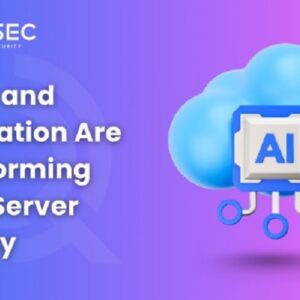
Cloud computing has revolutionised the way businesses operate, especially small businesses. Cloud computing provides small businesses with access to advanced technology, security, and storage solutions that were previously unaffordable. This has opened up a world of opportunities for small businesses, enabling them to compete with larger enterprises and expand their operations.
Cloud computing has made it simpler and more affordable for small businesses to get the tools and resources they need to thrive. By taking advantage of cloud-based solutions, small businesses can open up new avenues, boost productivity, and compete with larger enterprises in their industry.
The demand for cloud computing and its services are increasing and will reach to its potential in next few years. According to market.us, The global cloud computing market was valued at USD 522 billion in 2022. It is expected to reach USD 2,972.6 billion at a CAGR of 19% between 2022 to 2032.

Small businesses are always on the lookout for ways to compete with larger competitors, and cloud computing has emerged as an invaluable resource. By giving small businesses access to scalable computing resources, software applications, and collaboration tools via the cloud, these services can help reduce costs, boost productivity, and enhance efficiency. With the flexibility of the cloud computing small businesses are unlocking new opportunities to scale their business.
What is cloud computing?
Cloud computing is the delivery of computing services such as servers, storage, databases, software, and analytics over the internet. Instead of investing in costly hardware and software, users can access these resources as needed from a cloud service provider on a pay-per-use basis.
Cloud service providers manage and maintain the underlying infrastructure, guaranteeing its availability, security, and scalability. This enables businesses, individuals, and organisations to access advanced computing resources without needing to invest in costly infrastructure or manage it themselves.
Types of Cloud Computing
Three primary types of cloud services exist. Each provides businesses with varying levels of control over their computing resources, enabling them to select the one that best meets their requirements.
- Software as a Service (SaaS): SaaS is an internet-based cloud service that lets businesses access software applications without purchasing and installing them on their own hardware. Instead, they pay a subscription fee to access the applications through the cloud service provider’s servers. SaaS can be used for many different applications like email, accounting, and project management tools.
- Platform as a Service (PaaS): PaaS provides businesses with an application development and deployment platform, allowing them to use pre-built tools and components without worrying about the underlying infrastructure. PaaS can be utilised for various tasks such as web and mobile app creation, data analysis, etc.
- Infrastructure as a Service (IaaS): IaaS provides businesses with computing resources such as servers, storage, and networking over the internet. Businesses can rent infrastructure on a pay-per-use basis instead of having to purchase and maintain their own hardware. Iaas can be used for various applications like website hosting, data storage and backup, and virtual desktops.
Businesses have various levels of control over their computing resources when using cloud services. SaaS gives businesses access to software applications, PaaS provides a platform for application development and IaaS provides computing infrastructure.
By selecting the ideal cloud service, businesses can save money, boost efficiency and gain access to computing resources necessary for success in today’s digital economy.
How is cloud computing used in business?
Cloud computing has become an essential part of many businesses, providing a range of benefits that help organisations to be more agile, efficient, and competitive. One of the key ways that cloud computing is used in business is by providing scalable computing resources.
This means that businesses can access servers, storage, and databases as and when they need them, without having to invest in expensive hardware or emplo additional IT staff. This makes it easier for businesses to adjust their computing resources in response to changing demand or growth.
Another important use of cloud computing in business is through software as a service (SaaS). Many businesses now use cloud-based software applications, such as email, accounting, and project management tools, on a subscription basis. This eliminates the need for businesses to purchase and install software on individual computers, and allows employees to access these applications from anywhere, at any time.
Cloud computing also enables businesses to collaborate more effectively, whether through file sharing, video conferencing, or other collaborative tools. So that the employees can work together on projects from anywhere in the world, in real-time. This helps to improve productivity, as well as streamline communication and decision-making.
Cloud computing is also used in business to improve data security. Cloud service providers often offer advanced security features, such as data encryption and multi-factor authentication, that help to protect business data from cyber threats. Additionally, cloud-based backups and disaster recovery solutions can help businesses to recover quickly in the event of a data breach or other disaster.
Importance cloud computing in small businesses:
Cloud computing has become increasingly crucial for small businesses in recent years, providing them with access to advanced technology, security measures and storage solutions that were once only available to larger firms.
One major advantage of cloud computing for small businesses is cost savings. By forgoing expensive hardware, software, and IT infrastructure requirements, businesses can save on upfront expenses and pay only for what they actually use. This frees up resources to focus on other critical areas like marketing, sales, and customer service.
Another major advantage of cloud computing for small businesses is increased scalability. Cloud-based solutions make it simple for these businesses to scale up or down as needed without investing heavily in technology. This enables them to respond rapidly to changes in demand, adjust according to changing market trends & conditions, and remain competitive within their industry.
In conclusion, cloud computing has proven to be an indispensable asset for small businesses seeking to stay ahead of the digital economy. Cloud computing allows small businesses to gain access to scalable computing resources, software applications, and collaboration tools that can help reduce costs, boost productivity levels, and enhance efficiency.
Additionally, cloud-based data backups and security solutions can offer small businesses the protection they need from cyber threats. Small businesses can especially benefit from cloud computing’s flexibility and cost-efficiency, as it grants them access to advanced computing resources otherwise unavailable.
Author Profile
- I am the owner of the blog readree.com. My love for technology began at a young age, and I have been exploring every nook and cranny of it for the past eight years. In that time, I have learned an immense amount about the internet world, technology, Smartphones, Computers, Funny Tricks, and how to use the internet to solve common problems faced by people in their day-to-day lives. Through this blog, I aim to share all that I have learned with my readers so that they can benefit from it too. Connect with me : Sabinbaniya2002@gmail.com
Latest entries
 Digital MarketingJuly 5, 2025How to Choose the Right Plugins for Your Creative Agency
Digital MarketingJuly 5, 2025How to Choose the Right Plugins for Your Creative Agency Digital MarketingJuly 4, 2025How to Choose an SEO Agency: 7 Tips & Tricks
Digital MarketingJuly 4, 2025How to Choose an SEO Agency: 7 Tips & Tricks Artificial IntelligenceJuly 1, 2025How AI and Automation Are Transforming Cloud Server Security
Artificial IntelligenceJuly 1, 2025How AI and Automation Are Transforming Cloud Server Security Digital MarketingJune 28, 2025How to Set Conditional Free Shipping Thresholds in WooCommerce
Digital MarketingJune 28, 2025How to Set Conditional Free Shipping Thresholds in WooCommerce